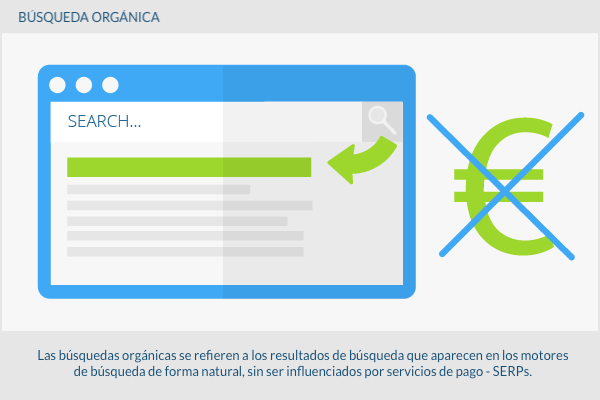The organic search refers to search results that appear in search engines naturally, without being influenced by paid commercial promotion. Organic search results are ranked based on their relevance to the search term. In this way, they do not include ads, but they can include snippets such as maps, images, posts or the knowledge graph.
Definition
The organic searches they encompass all search results that appear thanks to the individual search engine algorithm. This is defined by the search engine operator and can vary from provider to provider. Therefore, the SERPs on Google, Bing, or Yahoo may not match. It is not feasible to buy "positioning" in the SERPs. In this way, organic search differs from paid search results in that in the latter, its positioning depends on how much the advertiser is willing to pay.
Manipulate organic search rankings
In the context of SEO It is feasible that the positioning of a web portal in the SERPs is manipulated but it involves a lot of time and work. According to a study by the English blog Moz.com, each web portal has a cost of between 1,000 and 7,500 dollars to boost its positioning. The average hourly price for SEO agencies is between $ 76 and $ 200.
Google Analytics expert Avinash Kaushik determines that 86% of users prefer organic searches. With a ranking among the first results, websites can reach a much higher level of traffic than through private commercial promotion.
If you wanted to get the same traffic from your ads as you get from organic search, the costs would be much higher than for search engine optimization. The Cost Per Click (CPC) with SEO is much lower than that of paid ads (SEA).
Positioning factors
There are many different factors that impact ranking. Some examples are:
- Participation in social networks (Facebook, Google+, Twitter, Pinterest)
- Link structure internal and external
- Technical factors (URL length, loading time, etc.)
- Content quality and structure
- Media quality images and videos
All search results optimization methods fall into two areas: OnPage and OffPage optimization. Optimization OnPage it is everything related to the optimization of your web portal. That is, the content, the structure of internal links, the loading and browsing speed, etc. On the other hand, optimization OffPage take part outside of your web portal, for example, through link building or activities on social networks.
Relevance in SEO
Improve positioning in organic searches It is the main goal of SEO optimization. Due to increased competition, achieving that goal has become a truly difficult task. At the same time, Google regularly updates its algorithms in this way, SEO experts have to apply the necessary changes as soon as possible so as not to lose the positioning obtained. Sometimes it is even necessary to delete previous SEO measures so as not to be penalized with the new update. This happened, for example, with the well-known "Link degradation", particularly during the period after the update of the Google penguin in April 2012.
Web Links
- Analysis techniques for organic Google search and SEO support.google.com
- 13 ethical ways to increase search traffic to your website Blog marketingdirecto.com




